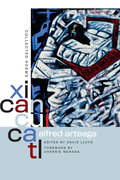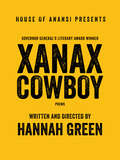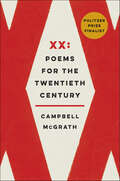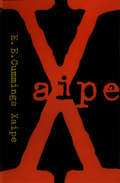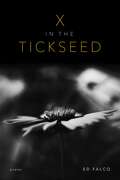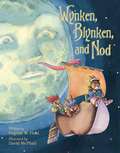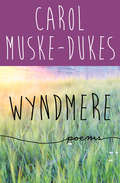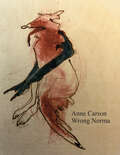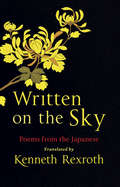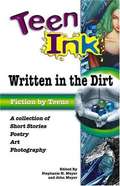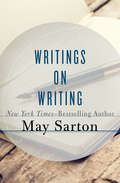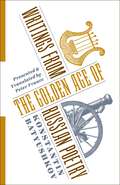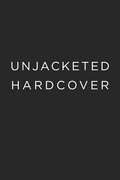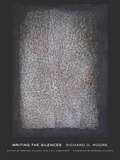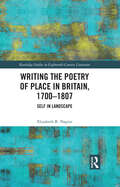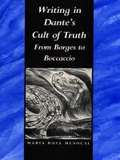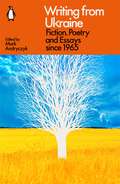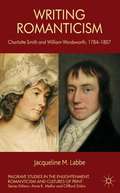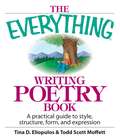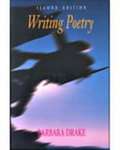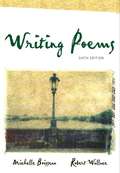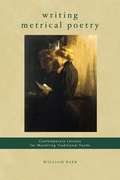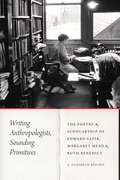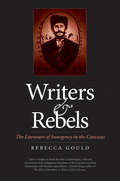- Table View
- List View
Xicancuicatl: Collected Poems (Wesleyan Poetry Series)
by Alfred ArteagaXicancuicatl collects the poetry of leading avant-garde Chicanx poet Alfred Arteaga (1950–2008), whom French philosopher Gilles Deleuze regarded as "among those rare poets who are able to raise or shape a new language within their language." In his five published collections, Arteaga made crucial breakthroughs in the language of poetry, basing his linguistic experiments on the multilingual Xicanx culture of the US Southwest. His formal resources and finely tuned ear for sound patterns and language play remain astonishing. His poetical work, presented as a whole here for the first time, speaks more than ever to a moment in which border-crossing, cultural diversity, language-mixing and a multi-cultural vision of America are critical issuesCAMINO IMAGINADOBlue leaves, hojas rotas in the shape of stars.Ni un "no" en tu vocabulario but for others;blue in place of green in the shape of Spain.Ojos the color of dirt, chocolate, coffee, time,azules las horas, hojas de horas van y se van,ni una palabra, ni una queja, nor broken bita tu lado beside me andamos walking, sí walkingcaminamos caminos like these, such streets, whatcity.7/15/95 Paris.
Xanax Cowboy: Poems
by Hannah GreenThe Xanax Cowboy has a reputation like a rattlesnake. She might as well be a strike-anywhere match in a gasoline town. Her whiskey is mixed with vengeance like her mind is mixed with pills. The last doctor who told her she ain't nothin' is still spitting blood through a split lip.
XX: Poems for the Twentieth Century
by Campbell McGrathA poetic history of the twentieth century from one of our most beloved, popular, and highly lauded poets—a stirring, strikingly original, intensely imagined recreation of the most potent voices and searing moments that have shaped our collective experience.XX is award-winning poet Campbell McGrath’s astonishing sequence of one hundred poems—one per year—written in a vast range of forms, and in the voices of figures as varied as Picasso and Mao, Frida Kahlo and Elvis Presley. Based on years of historical research and cultural investigation, XX turns poetry into an archival inquiry and a choral documentary. Hollywood and Hiroshima, Modernism and propaganda, Bob Dylan and Walter Benjamin—its range of interest encompasses the entire century of art and culture, invention and struggle.Elegiac and celebratory, deeply tragic and wickedly funny, XX is a unique collection from this acknowledged master of historical poetry, and his most ambitious book yet.
XAIPE
by E. E. CummingsXAIPE (Greek for "rejoice"), which first appeared in 1950, contains some of E. E. Cummings's finest work. Among many poems can be found "dying is fine)but Death," "so many selves(so many friends and gods," "when serpents bargain for the right to squirm," "no time ago," "I thank You God for most this amazing," and "now all the fingers of this tree(darling)have."
X in the Tickseed: Poems
by Ed FalcoFrom discursive essay-poems to tightly constructed lyrics, Ed Falco’s X in the Tickseed examines a world that reveals itself through its mysteries, reflecting upon the ephemeral nature of all things. In the series of poems that bookend the collection, a speaker identified only as X reviews personal history and relationships, speculating, pondering, and questioning in the face of a baffling universe. Peppered between the X poems, artists as varied as Artemisia Gentileschi, Frank O’Connor, and Nick Cave surface, usually in poems posing as essays about their art. Other poems range from explorations of cultural perspective, as in “A Few Words to a Young American Killed in the Tet Offensive,” where a war resister addresses a young man of his generation who died in Vietnam, to the often playful “An Alphabet of Things.” Throughout, Falco’s poems speculate on matters of life and faith, intensified by an awareness of death.
Wynken, Blynken, and Nod
by Eugene FieldThree fishermen embark on a magical dream as they climb aboard a wooden shoe. Up into the sky they sail to catch the stars in nets of silver and gold. And when it's time for the journey to end, the wooden shoe carries the tired fishermen home to the real world of a child ready for sleep.
Wyndmere: Poems
by Carol Muske-DukesPoems on the power of memory and the shading of past into presentIn this enthralling collection, National Book Award finalist and former Poet Laureate of California Carol Muske-Dukes composes a lyrical autobiography, tracing her family history from the Dakota prairie to her new life as a young mother in Los Angeles. In &“The Separator,&” Muske-Dukes writes of her grandfather, a wheat farmer, winnowing, threshing, planting a future in the deep black soil of Wyndmere, North Dakota. In &“Biglietto d&’Ingresso,&” she recalls a perfect day in Tuscany, spent with her future husband in a town overlooking a wine valley. &“August, Los Angeles, Lullaby&” is a lulling yet harrowing description of the wonder of a mother holding her newborn child—and her own fragility, encountering mortality—as a hummingbird touches the hourglass of the feeder outside the window . . . then is gone.
Wrong Norma
by Anne CarsonAnne Carson’s first original work since Float (Knopf, 2016) Published here in a stunning edition with images created by Carson, several of the twenty-five startling poetic prose pieces have appeared in magazines and journals like The New Yorker and The Paris Review. As Carson writes: “Wrong Norma is a collection of writings about different things, like Joseph Conrad, Guantánamo, Flaubert, snow, poverty, Roget's Thesaurus, my Dad, Saturday night. The pieces are not linked. That's why I've called them ‘wrong.’"
Written on the Sky: Poems from the Japanese
by Kenneth Rexroth Eliot Weinberger"Rexroth's readings from the Japanese master poets are breathtaking in their simplicity and clarity."--The New York Times I go out of the darkness Onto a road of darkness Lit only by the far off Moon on the edge of the mountains. --Izumi Shikobu Over the years, thousands of readers have discovered the beauty of classic Japanese poetry through the superb English versions by the great American poet Kenneth Rexroth. Mostly haiku, these poems range from the classical and medieval to modern poetry, with an emphasis on folk songs and love lyrics. Because women played such an outstanding role in Japanese literature, included here are selections from their work, including the contemporary, deeply sensuous Marichiko. This elegant, beautifully designed gift book of poems spanning many centuries presents the original texts in romanji, the transliteration into the Western alphabet.
Written in the Dirt: A Collection Of Short Stories, Poetry, Art and Photography
by Stephanie H. Meyer John MeyerAfter five successful books, Teen Ink: Written in the Dirt offers a startlingly different collection that presents teens' innermost thoughts. These teen-authored fictional stories are filled with incredible character development, gripping plots, imagination and, of course, insight into the human condition. Their poems sing, soar and capture the essence of teen life. Consistent throughout this smash series, teens who have written for Teen Ink magazine candidly share their real voices, while poignant photography and artwork also capture their extraordinary talents and thoughts.
Writings on Writing
by May SartonMay Sarton's lifetime of work as a poet, novelist, and essayist inform these illuminating reflections on the creative life In "The Book of Babylon," May Sarton remarks that she is not a critic--except of her own work. The essay addresses questions that have haunted Sarton's own creative practice, such as the concept of "tension in equilibrium"--balancing past and present, idea and image. She also cites poems written by others to describe the joy of writing and how we must give ourselves over to becoming the instruments of our art. "The Design of a Novel" is about fiction writing--where ideas come from, how theme and character determine plot, the mistakes many fledgling authors make, and how and why the novel differs from the poem. Further texts examine the act of composing verse, one's state of mind when writing poetry, the role of the unconscious, how revising is the loftiest form of creation, and how to keep growing as an artist. Throughout the collection, Sarton also warns about the dangers of trying to analyze the creative process too closely. A book that doesn't separate art from the artist's life, Writings on Writing is filled with Sarton's trademark imagery and insights, letting us know we're in the hands of a master.
Writings from the Golden Age of Russian Poetry (Russian Library)
by Konstantin BatyushkovKonstantin Batyushkov was one of the great poets of the Golden Age of Russian literature in the early nineteenth century. His verses, famous for their musicality, earned him the admiration of Alexander Pushkin and generations of Russian poets to come. In Writings from the Golden Age of Russian Poetry, Peter France interweaves Batyushkov’s life and writings, presenting masterful new translations of his work with the compelling story of Batyushkov’s career as a soldier, diplomat, and poet and his tragic decline into mental illness at the age of thirty-four. Little known among non-Russian readers, Batyushkov left a varied body of writing, both in verse and in prose, as well as memorable letters to friends. France nests a substantial selection of his sprightly epistles on love, friendship, and social life, his often tragic elegies, and extracts from his essays and letters within episodes of his remarkable life—particularly appropriate for a poet whose motto was “write as you live, and live as you write.” Batyushkov’s writing reflects the transition from the urbane sociability of the Enlightenment to the rebellious sensibility of Pushkin and Lermontov; it spans the Napoleonic Wars and the rapid social and literary change from Catherine the Great to Nicholas I. Presenting Batyushkov’s poetry of feeling and wit alongside his troubled life, Writings from the Golden Age of Russian Poetry makes his verse accessible to English-speaking readers in a necessary exploration of this transitional moment for Russian literature.
Writing the Silences
by Richard O. MooreEdited by Brenda Hillman and Paul Ebenkamp.The poems in Writing the Silences represent more than 60 years of Richard O. Moore’s work as a poet. Selected from seven full-length manuscripts written between 1946 and 2008, these poems reflect not only Moore’s place in literary history—he is the last of his generation of the legendary group of San Francisco Renaissance poets—but also his reemergence into today’s literary world after an important career as a filmmaker and producer in public radio and television. Writing the Silences reflects Moore’s commitment to freedom of form, his interest in language itself, and his dedication to issues of social justice and ecology.
Writing the Silences
by Richard O. MooreThe poems in "Writing the Silences" represent more than 60 years of Richard O. Moore's work as a poet. Selected from seven full-length manuscripts written between 1946 and 2008, these poems reflect not only Moore's place in literary history-he is the last of his generation of the legendary group of San Francisco Renaissance poets-but also his reemergence into today's literary world after an important career as a filmmaker and producer in public radio and television. "Writing the Silences" reflects Moore's commitment to freedom of form, his interest in language itself, and his dedication to issues of social justice and ecology.
Writing the Poetry of Place in Britain, 1700–1807: Self in Landscape (Routledge Studies in Eighteenth-Century Literature)
by Elizabeth R. NapierThis book discusses the intrusion, often inadvertent, of personal voice into the poetry of landscape in Britain, 1700-1807. It argues that strong conventions, such as those that inhere in topographical verse of the period, invite original poets to overstep those bounds while also shielding them from the repercussions of self-expression. Working under cover of convention in this manner and because for each of these poets place is tied in significant ways to personal history, poets of place may launch unexpected explorations into memory, personhood, and the workings of consciousness. The book supplements traditionally political readings of landscape poetry, turning to questions of self-articulation and self-expression in order to argue that the autobiographical impulse is a distinctive and innovative feature of much great eighteenth-century poetry of place. Among the poets under examination are Pope, Thomson, Duck, Gray, Goldsmith, Crabbe, Cowper, Smith, and Wordsworth.
Writing the Monarch in Jacobean England
by Jane RickardKing James VI and I's extensive publications and the responses they met played a key role in the literary culture of Jacobean England. This book is the first sustained study of how James's subjects commented upon, appropriated and reworked these royal writings. Jane Rickard highlights the vitality of such responses across genres - including poetry, court masque, sermon, polemic and drama - and in the different media of performance, manuscript and print. The book focuses in particular on Jonson, Donne and Shakespeare, arguing that these major authors responded in illuminatingly contrasting ways to James's claims as an author-king, made especially creative uses of the opportunities that his publications afforded and helped to inspire some of what the King in turn wrote. Their literary responses reveal that royal writing enabled a significant reimagining of the relationship between ruler and ruled. This volume will interest researchers and advanced students of Renaissance literature and history.
Writing in Dante’s Cult of Truth: From Borges to Bocaccio
by María Rosa MenocalUsing the works of Dante as its critical focus, María Rosa Menocal's original and imaginative study examines questions of truth, ideology, and reality in poetry as they occur in a series of texts and in the relationship between those texts across time. In each case, Menocal raises theoretical issues of critical importance to contemporary debates regarding the structure of literary relations.Beginning with a reading of La vita nuova and the Commedia, this literary history of poetic literary histories explores the Dantean poetic experience as it has been limited and rewritten by later poets, particularly Petrarch, Boccaccio, Borges, Pound, Eliot, and the all but forgotten Silvio Pellico, author of Le mie prigioni. By blending discussions of Dante's own marriage of literature and literary history with those investigations into the imitative qualities of later works, Writing in Dante's Cult of Truth presents an intertextual literary history, one which seeks to maintain the uncanniness of literature, while imagining history to be neither linear nor clearly distinguishable from literature itself.
Writing from Ukraine: Fiction, Poetry and Essays since 1965
by Mark AndryczykA selection of fifteen of Ukraine's most important, dynamic and entertaining contemporary writersUnder USSR rule, the subject matter and style of literary expression in Ukraine was strictly controlled and censored. But once Ukraine gained independence in 1991 its literary scene flourished, as the moving and delightful poems, essays and extracts collected here show. There are fifteen authors included in this book, both established and emerging, and in this anthology we see them grappling with history and the future, with big questions and small moments. From essays about Chernobyl to poetry about Robbie Williams, from fiction discussing Jimmy Hendrix live in Lviv to underground Ukrainian poetry of the Soviet era, WRITING FROM UKRAINE offers a unique window into a rich culture, a chance to experience a particularly Ukrainian sensibility and to celebrate Ukraine's nationhood, as told by its writers.
Writing Romanticism
by Jacqueline M. LabbeWhat is 'Wordsworthian' Romanticism and how did it evolve? This book argues that only by reading Charlotte Smith's poetry in tandem with William Wordsworth's can this question be answered, demonstrating their mutual contribution to the creation of the 'Wordsworthian', through literary analysis and historical contextualizing of their writings.
Writing Poetry Book (The Everything )
by Todd Scott Moffett Tina D EliopulosGiving voice to ''what gets lost in translation'' is the challenge every poet faces. With The Everything Writing Poetry Book, that challenge just got easier. Featuring examples from works of celebrated poets and instruction on communicating your ideas, this clear and accessible reference helps you gain confidence as you find your own voice. Written by a team who each hold a master’s degree and teach creative writing and literature, this easy-to-follow guide has all you need to take your work to the next level. - With this handy guide, you will learn to:Create meter and rhyme - Express your innermost thoughts - Use imagery and metaphor - Polish your word play - Find your own rhythm - Work with other writersand more - The Everything Writing Poetry Book helps you make the most of this rewarding craft - whether you’re a fledgling poet or a seasoned wordsmith.
Writing Poetry (Second Edition)
by Barbara DrakeThe book intends to be an all-purpose poetry writing textbook, an inspiration and information on the writing process, a solid first step for beginners, and a source of ideas for writers and teachers at all levels.
Writing Poems (6th edition)
by Michelle Boisseau Robert WallaceThis book offers comprehensive coverage of the creative process and the technical aspects of writing poetry.
Writing Metrical Poetry: Contemporary Lessons For Mastering Traditional Forms
by William BaerWrite poetry in the great metrical tradition of Dante, Shakespeare, Dickinson, Frost, and the poets of the current Formalist revival. In this contemporary guide, you'll learn how to write metrical poetry in all the major forms, from blank verse and quatrains to sonnets and villanelles. Each chapter provides step-by-step instruction that's accessible and easy to understand for even the beginning poet.
Writing Anthropologists, Sounding Primitives: The Poetry and Scholarship of Edward Sapir, Margaret Mead, and Ruth Benedict (Critical Studies in the History of Anthropology)
by A. Elisabeth ReichelWriting Anthropologists, Sounding Primitives re-examines the poetry and scholarship of three of the foremost figures in the twentieth-century history of U.S.-American anthropology: Edward Sapir, Margaret Mead, and Ruth Benedict. While they are widely renowned for their contributions to Franz Boas&’s early twentieth-century school of cultural relativism, what is far less known is their shared interest in probing the representational potential of different media and forms of writing. This dimension of their work is manifest in Sapir&’s critical writing on music and literature and Mead&’s groundbreaking work with photography and film. Sapir, Mead, and Benedict together also wrote more than one thousand poems, which in turn negotiate their own media status and rivalry with other forms of representation. A. Elisabeth Reichel presents the first sustained study of the published and unpublished poetry of Sapir, Mead, and Benedict, charting this largely unexplored body of work and relevant selections of the writers&’ scholarship. In addition to its expansion of early twentieth-century literary canons, Writing Anthropologists, Sounding Primitives contributes to current debates about the relations between different media, sign systems, and modes of sense perception in literature and other media. Reichel offers a unique contribution to the history of anthropology by synthesizing and applying insights from the history of writing, sound studies, and intermediality studies to poetry and scholarship produced by noted early twentieth-century U.S.-American cultural anthropologists.
Writers and Rebels: The Literature of Insurgency in the Caucasus
by Rebecca Ruth GouldSpanning the period between the end of the Russo-Caucasian War and the death of the first female Chechen suicide bomber, this groundbreaking book is the first to compare Georgian, Chechen, and Daghestani depictions of anticolonial insurgency. Rebecca Gould draws from previously untapped archival sources as well as from prose, poetry, and oral narratives to assess the impact of Tsarist and Soviet rule in the Islamic Caucasus. Examining literary representations of social banditry to tell the story of Russian colonialism from the vantage point of its subjects, among numerous other themes, Gould argues that the literatures of anticolonial insurgency constitute a veritable resistance--or "transgressive sanctity"--to colonialism.
